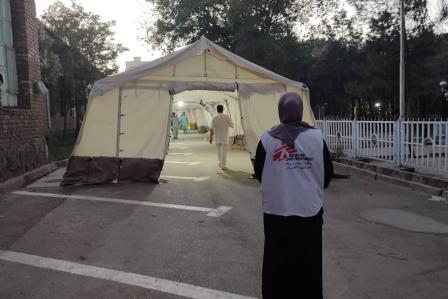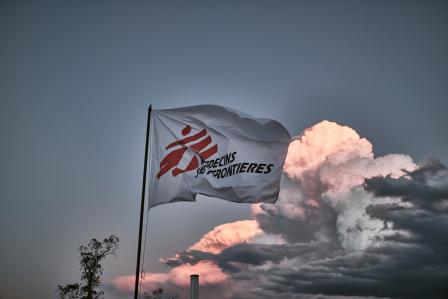Afghanistan: Life after earthquakes in Herat
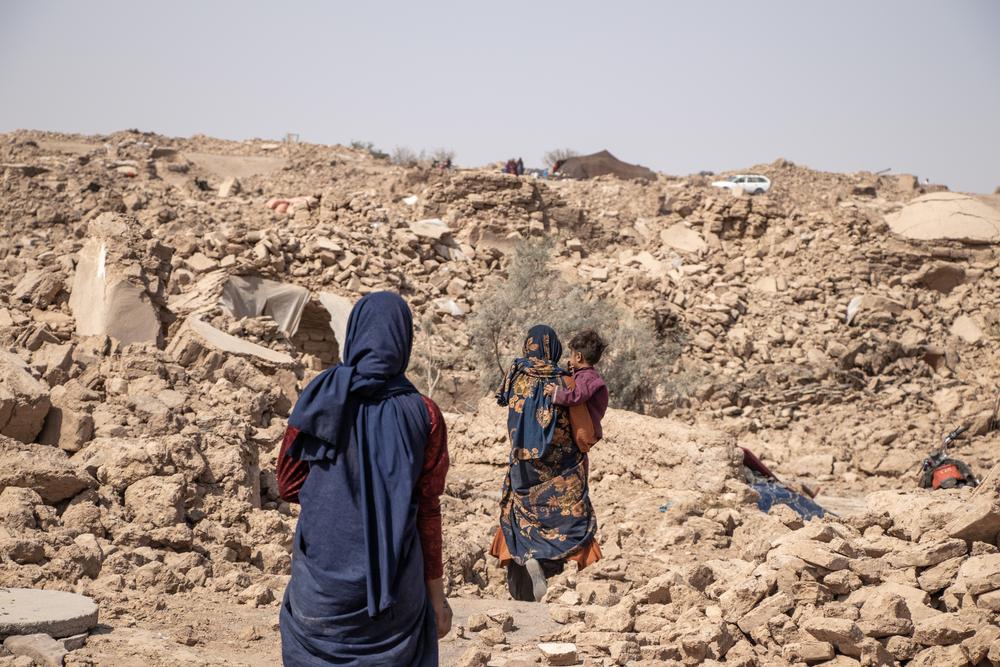
Two women and a child walk past destroyed houses in Cha Hak Village, Injil District, Herat Province. All houses in the village were destroyed. Afghanistan, 2023. © Paul Odongo/MSF
At the Herat Regional Hospital, where Doctors Without Borders / Médecins Sans Frontières (MSF) runs regular activities in the paediatric department, Doctors Without Borders donated mass casualty kits and erected a total of 10 tents in the hospital compound to accommodate the wounded and their caretakers. On the first days, approximately 540 wounded were treated at the hospital, followed by 126 after the earthquake on Wednesday 11 October, and 167 after the earthquake on Sunday 15 October. The number of dead has been estimated by the authorities at around 2,000 but figures remain unclear.
Most patients have mild to moderate injuries, and mental health support remains a primary need. Many people have lost family members, their homes and possessions, and are sometimes among the last survivors from their village. Doctors Without Borders teams have been visiting some of the worst-affected areas outside the city to assess the medical needs, including the district of Zinda Jan.
Some of the earthquake survivors share their stories:
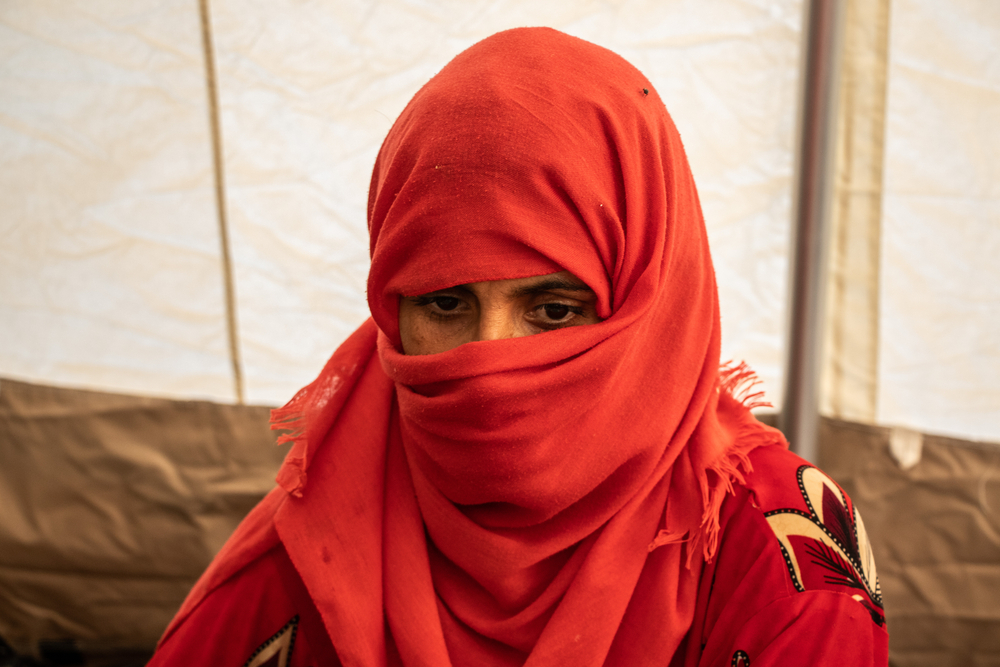
Rabieh Jamali
Rabieh Jamali’s village of Seya Hab, Zinda Jan District, was destroyed in the earthquake. She is staying in the hospital compound with her father, Gul Mohamed, and other surviving members of her family. Rabieh suffered injuries to her leg, head and back. The family have been at the hospital for five days and despite being discharged, they have chosen to stay in the tents.
"When the first earthquake hit, we had just had our lunch and my husband and daughter had stepped outside. That’s when we heard a loud noise, felt some shaking, and everything went black. I woke up to people removing bricks from my body and the rest of my family. There were six people in the room at the time; my three-year-old daughter was killed.
I was taken by helicopter from the village to a military hospital where we spent one night before being brought here [Herat Regional Hospital]. My seven-year-old son, Amaleh is not in good condition, and I am worried about him. He has been admitted to one of these wards and my father goes to see him. He lost most of his teeth, his nose was broken, and his head was severely injured.
The hospital has told us to go home, but what do we go back to? We don’t have anything now. All the houses in our village were destroyed. People have been coming to these tents and they gave us cups, flasks and blankets. But we need a tent or a home."
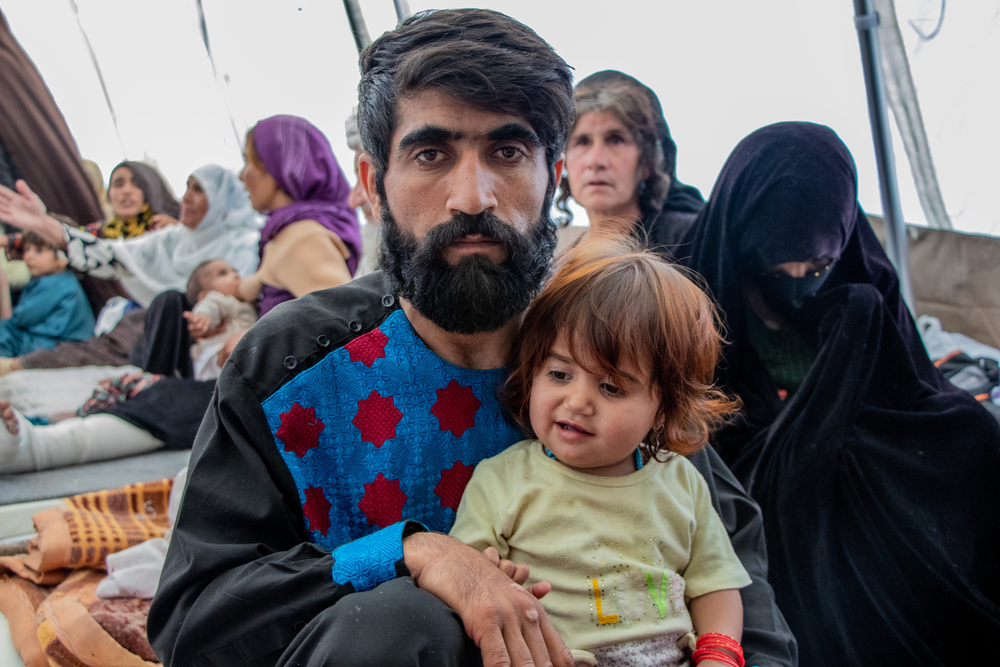
Hassan Mirzai and Shamaeil
Hassan Mirzai and his wife, Shamaeil, 25, come from Naieb Rafi village in Zinda Jan District. They are in the hospital tent with their two-year-old daughter and Hassan’s mother. Hassan was at work when the earthquake struck on 7 October, destroying their house. Shamaeil was injured when the wall of the house collapsed on her, breaking her leg and hurting her back. She was pregnant and was due to deliver soon, but she has since lost the baby.
"My daughter was covered in rubble but thankfully she wasn’t hurt. We were both trapped. When we were pulled from under the debris, I was bleeding and lost consciousness. I was told we were brought here by helicopter," said Shamaeil.
"When I regained consciousness, I found myself in the maternity ward. I tried to remember what had happened. I initially thought only my house had been damaged, but then my mother and some relatives told me that the whole village had been levelled. I also learned then that I had lost my baby."
"Many people died in the earthquake: my uncle, nephew, neighbours and so many relatives that I can’t even begin to count. We also lost our livestock," she continued.
"When the helicopter came, it took my wife and little girl, and I came later by ambulance. I found that they had been brought to this tent. We haven’t been told when she can leave the hospital, but we don’t have a home to go back to anyway," said Hassan.
"At the moment, my wife sleeps in the tent with one of the family and my little girl, and I sleep outside."
"We need blankets, carpets, a tent and a home. With the coming winter, we will need gas or a stove to heat our home to be safe and warm."
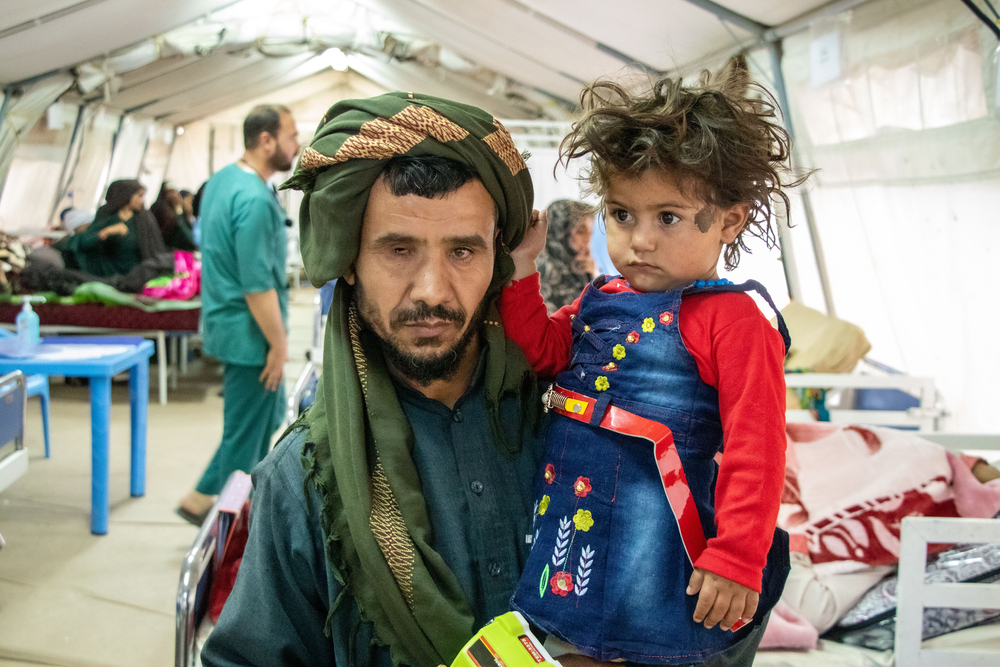
Farhah Din Malik and Madina*
Farhah Din was working in Iran when he received news of the earthquake from his brother, and he immediately set off to be with his family. The journey took him two days. He is now in the Doctors Without Borders tent with his 12-year-old sister, his wife Madina, his brother’s wife and another relative.
"I just arrived here yesterday [Wednesday 10 October] and I am taking care of four patients. I have been working in Iran for the last nine months as a guard. On Saturday 7 October, I had just woken up after my night shift and was washing before prayer when I received a phone call from my brother. He was crying, telling me to come home and that we had lost many members of our family. When I asked who, he started counting: my mother, my nine-month-old daughter, my sister, his three-year-old daughter. He told me that the whole village had collapsed. “Please run,” he said. I started crying."
"I started looking for a taxi to take me to Tehran where I would take a bus to Afghanistan. It took two days to get here. I arrived at around 11 pm and went straight to the village. I found nothing but rubble. I stayed there for the night and came to the hospital the following morning."
"When I arrived at the hospital, I went to the registration desk and told them the name of my family and was directed here. I found my brother, we hugged each other and cried. Then I came to see my wife and sister," Farhah said.
"We were in the house when the earthquake struck. The roof fell and we were buried. My nine-month-old baby was in the bedroom in his cradle, and he died under the rubble," Madina said.
"I have stitches in my head and pain in my back. We were brought here by a helicopter. Today, the doctors took my name and said they want to discharge me, but I don’t know where to."
"Our biggest need right now is a home. The winter is extremely cold in our village and a tent will not help."
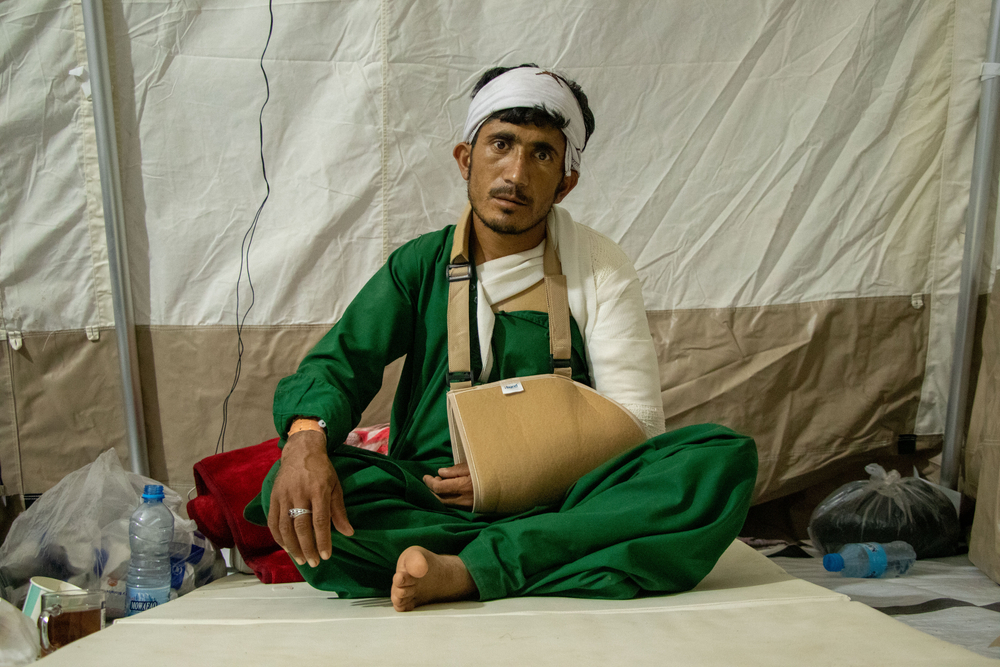
Sangin
Sangin is from Naieb Rafi village in Zinda Jan District. He has a broken arm and sprained shoulder, and before the earthquake he had recently become engaged and was saving up for the wedding. His four sisters died in the earthquake.
"It was around 11.30am when something like a strong wind came and the ground shook, collapsing the whole village. Only a few people survived, and I am still thinking whether I am lucky to have been among them.
I was working outside that morning and had gone home to have lunch with my mother and four sisters. Just as I was about to leave, the earthquake struck. I wanted to run outside but was trapped when the wall fell on me. My sisters heard my voice and as they were also trying to run the roof fell on them.
I shouted and people came and pulled me out. My sisters were all dead by the time they were pulled from under the debris. I lost consciousness and when I woke up, I was at the hospital with a bandage on my hand and an IV line running into my hand. That’s when I realized what had really happened. I still hear the tremors in my head.
As well as my sisters, I also lost two uncles and an aunt. My friends, family and neighbours, all of them have lost people. Everyone you talk to has lost many family members. Only one of my sisters survived because she was in Herat city at the time.
I feel alone. I have lost almost all my closest family. I don’t know what to do. I need money to survive, and I need to marry and build a home. I feel depressed. My mother is in one of the wards, but I don’t know which one. My father was in Iran when the earthquake happened, and I haven’t seen him. I don’t know where he is.
I haven’t been told when I will be discharged, but even if I am discharged, I don’t have a home to go to. A friend told me that they were given tents. But as you can see, I can’t work and need so much support. I need a home, food.
The devastation that the earthquake caused is all I see. I can’t get it off my mind no matter how hard I try."
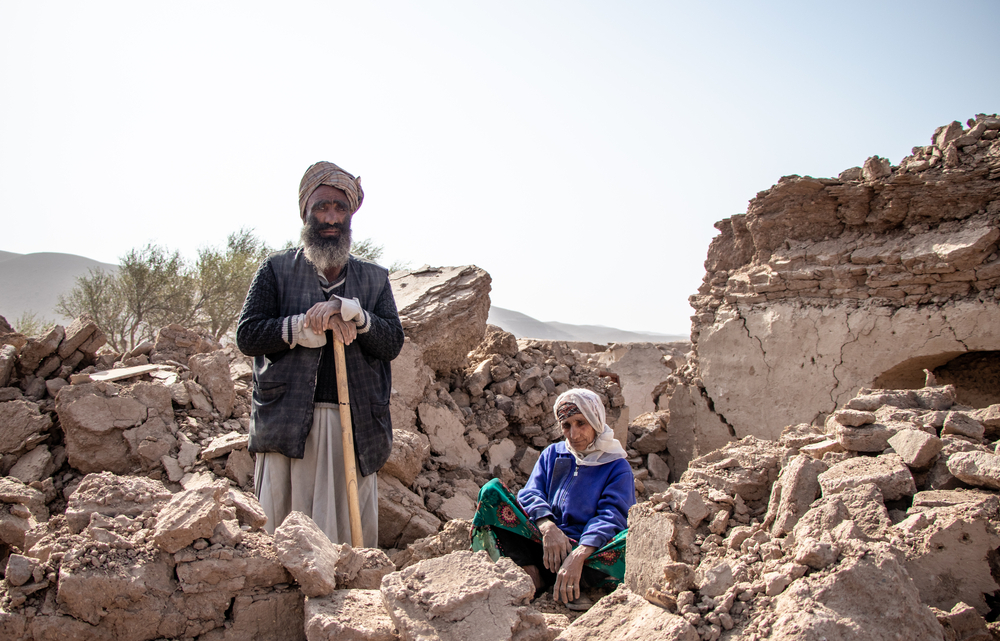
Abdul Salaam
Abdul Salaam is from Sanjaib village in Injil District. He speaks about what happened after the second earthquake.
"The first earthquake on Saturday destroyed everything in neighbouring villages and killed many people, but it spared us. However, this second earthquake destroyed all our homes. Luckily no-one was killed in our village as we were all sleeping outside when it struck. A few people were injured, for example my sister’s leg was broken and she is receiving treatment in Herat city.
We have lost everything and have nothing to live on. We lost our livestock, our belongings, and our home. We are trying to recover whatever we can."
*Names have been changed
Will you support our emergency response work?
Help us provide lifesaving medical care during emergencies by making a donation today.
